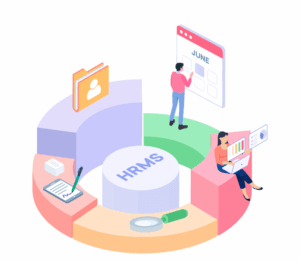Are you maximizing your HR productivity? In today’s rapidly evolving business environment, particularly in the dynamic economy of the UAE, effective workforce management is no longer just about handling paperwork. It’s about strategic growth, employee empowerment, and seamless HR automation.
A robust Human Resources Management System (HRMS), like Zeta HRMS, is the technological pillar that enables new-age businesses to achieve unprecedented business growth in the UAE through transforming traditional HR operations.
Below is a comprehensive step-by-step guide that will look at the extensive benefits of implementing an HRMS and provide an essential HRMS implementation guide for Emirates-based companies.
💡 Dive deeper into HRMS topics:
The Tangible Benefits of Implementing an HRMS
An HRMS deployment does not simply end at digitization; it’s a strategic investment that yields much return to every area of your organization.
Streamlining Core HR Functions
Ultimately, an HRMS automates the complex, often manual functions that consume a significant amount of valuable HR time. From capturing employee details to managing salaries, the right system ensures efficiency and accuracy.
Automated Payroll:
HRMS software in the UAE can automatically calculate salaries, allowances, deductions, and end-of-service benefits, thus reducing most manual errors and saving time. This has a direct implication on the WPS requirements for compliance.
Time and Attendance Management:
The latest tools track employees’ working hours, overtime, and shifts, seamlessly integrating this data directly into payroll.
Leave Management System:
Employees can request leave, managers approve with ease, and there are automatic accrual and payroll updates.
Compliance:
Ensures compliance with UAE labor regulations and laws.
Increasing Employee Engagement and Satisfaction
One of the major benefits of HRMS is that it can enable employees and make them feel more connected as a team.
Employee Self-Service Portal (ESS Portal):
An ESS portal allows employees to access their payslips, initiate leave, update personal information, and view company policies independently. It saves HR staff and provides a better employee experience with simple digital HR services.
To find out about how ESS portals are revolutionizing HR management in the UAE, check out our in-depth guide on Employee Self-Service HR Software UAE.
Communication:
Centralized platforms improve internal communication and transparency.
Enhancing Data Accuracy and Reporting for Strategic Decisions
An HRMS transforms HR from a reactive department into a strategic partner through robust data capabilities.
HR Analytics:
Gain deep insights into workforce trends, turnover rates, and performance metrics.
HR Reporting:
Generate customizable reports for decision-making, providing a clear picture of your human capital.
Acquisition of Data-Driven HR:
Leverage insights for smarter talent acquisition, performance management, and workforce planning, moving towards predictive analytics.
Compliance with UAE Labor Laws and Regulations
Gaining an understanding of UAE labor law, MOHRE regulations, WPS compliance, and gratuity calculation can be tricky. An HRMS simplifies all this.
Automated Compliance Checks:
Automated identification of possible compliance problems related to leave, working hours, and contracts.
Precise Calculations:
Offers precise gratuity and other end-of-service benefits calculation as per UAE legislations.
Compliance with Law:
Reduces the risk of penalties and legal disputes by maintaining accurate records and statutory compliance.
Reducing Running Costs and Manual Workload
The automation that accompanies an HRMS inherently implies substantial cost savings and increased HR efficiency.
Lower Administrative Burden:
Eliminates endless manual data input, paperwork, and frequent inquiries.
Savings on Cost:
Eliminates errors, reduces overtime demand, and optimizes resource utilization.
Fast Processes:
Fast processing of HR processes allows HR professionals to work on strategic projects rather than getting overwhelmed by repetitive admin work.
HRMS vs. HRIS: Understanding the Key Differences (for UAE Context)
HRIS and HRMS are commonly used interchangeably, but understanding their differences will help you choose a suitable system for your organization’s requirements.
What is HRIS (Human Resources Information System)?
An HRIS is principally focused on employees’ data management and storage. It is an electronic filing cabinet for employees’ data.
Data Management Focus:
An HRIS excels at managing critical HR data, including individual facts, compensation, benefits enrollment, and simple organizational structure.
Administrative Tasks:
Its power lies in automating day-to-day administrative tasks as well as generating standard reports on employee record compliance matters. It serves as the foundation layer for HR functions.
What is HRMS (Human Resources Management System)?
An HRMS encompasses all aspects of an HRIS but goes a very long way beyond simple data management to include higher-level, more strategic human resources functionality.
Extended Capabilities:
In addition to the basic HRIS functionality, an HRMS typically includes payroll, time and attendance, talent management (recruitment, performance, learning), and employee self-service modules.
Strategic HRMS:
It’s designed to cover the entire employee life cycle from hire to retire with capabilities for strategic decision-making, workforce planning, and compliance, as well as general record-keeping. It’s a more integrated HR technology solution than a stand-alone HRIS.
Your Step-by-Step HRMS Implementation Guide for UAE Businesses
Implementing an HRMS is a highly critical project with planning and execution. This is a guide to ease a smooth transition for your UAE business.
Phase 1: Needs Assessment and Vendor Selection
The first step is most crucial: finding your company’s tailored needs and choosing the best HR software vendor.
Define Your Needs:
Identify your current HR concerns, necessary functionalities (e.g., specific payroll software UAE functionalities, employee self-service portal requirements), and long-term goals.
Shortlist Vendors:
Look for HR tech consultants and vendors with an established reputation in the UAE, local compliance, and knowledge of the business. Consider Zeta HRMS in Dubai as a strong contender.
Evaluate Solutions:
How do features, scalability, support, and cost compare? Our detailed guide for how to choose the right HRMS for your UAE business offers an in-depth review of key factors.
Phase 2: Data Migration and System Setup
This phase involves importing your existing HR information into the new system along with setting up the software for your specific workflows.
Data Transfer:
Import employee information, past data, and payroll information securely.
System Setup:
Configure modules, rules, and permissions according to your company’s structure and rules. This can also involve customization to accommodate unique business processes.
Integration Services:
Integrate smoothly with other existing business systems, like accounting packages.
Phase 3: Training and User Adoption
An effective HRMS will not do much if your employees are not using it. Training and change management are crucial.
Comprehensive Training:
Provide thorough HR software training to HR staff, managers, and employees on the proper use of the new system.
Change Management:
Convey the benefits of the new system to facilitate user acceptance and minimize resistance. Proactively address concerns.
Phase 4: Post-Implementation Support and Optimization
Implementation is only the beginning. Ongoing support and constant enhancement are imperative.
Support:
Make sure that your vendor offers consistent support for technical problems, updates, and general questions.
System Updates:
Keep up with new features and system updates to get the best out of your HRMS investment.
Performance Monitoring:
Continuously monitor the performance of the system and collect user feedback for ongoing optimization.
Frequently Asked Questions
What is the greatest benefit of an HRMS?
The greatest benefit of an HRMS is that it may be used to centralize and automate diverse HR functions, and this leads to greater efficiency, cost savings, improved data accuracy, and improved compliance with labor laws. It turns the HR function into a strategic business growth driver.
How long does it take to deploy an HRMS?
HRMS deployment time varies significantly with company size, complexity, and the scope of customizations needed. An example small to medium-sized business implementation would be 2-4 months, while larger businesses with massive data migration would take 6-12 months or more.
Is there integration with existing systems for HRMS?
Yes, most modern-day HRMS systems are compatible for seamless integration with a variety of existing business systems, e.g., accounting packages, enterprise resource planning (ERP) packages, and special recruitment or learning management platforms. It becomes one data environment.
What is the distinction between HRIS and HRMS?
An HRIS (Human Resources Information System) focuses primarily on fundamental HR data management and administrative operations. An HRMS (Human Resources Management System) is a larger system that includes all HRIS functions and other strategic modules like payroll, time & attendance, and talent management.
Revolutionize Your HR with the Right HRMS Partner
In the current UAE business scenario, it is not only a choice but a necessity to implement a robust human resources management system for guaranteed growth, regulatory compliance, and employee satisfaction. By understanding the inherent benefits of the HRMS system and following a step-by-step HRMS implementation guide, your organization can unlock unparalleled efficiency and strategic advantage.
Ready to transform your HR operations? Learn more about Zeta HRMS software UAE and how our end-to-end HR solutions can empower your workforce and drive your business. For a free consultation or to witness our system live, book a free demo today.



